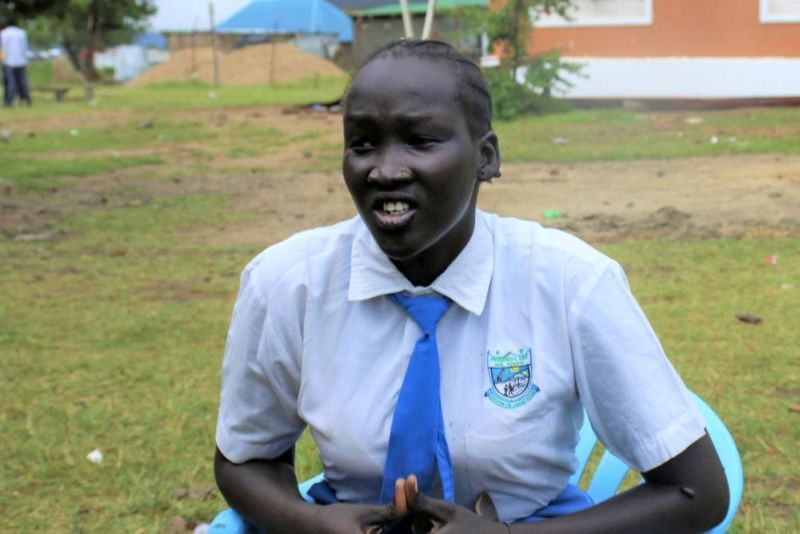Nyanachiek Madit, 21, who successfully refused when her father told her at age 17 that she would be married off to a man about 50 years old because her family couldn't afford to send her to school, speaks to The Associated Press in Juba, South Sudan on June 8, 2022. (AP File Photo)

Deng Machol
The Associated Press
Some young girls are still auctioned off into marriage for cows in South Sudan — one of the social challenges that activists had hoped to highlight during Pope Francis’ now-postponed visit.
The price of a daughter, determined in negotiations between her father and would-be husband, is typically 50 to 100 cows, each worth up to $1,000. A girl viewed as beautiful, fertile and of high social rank can bring as many as 200 cows. One girl in a well-publicized case a few years ago was auctioned off for 520 cows, plus cars.
“The younger the girl marries, the more the family gets cattle in return,” said Jackline Nasiwa, executive director of the Center of Inclusive Governance, Peace and Justice in South Sudan’s capital, Juba. “They sell their daughters so that they get something to survive.”
Though South Sudanese law limits marriage to those age 18 and over, it’s rarely enforced, particularly in rural areas.
South Sudan’s independence from Sudan in 2011 brought widespread hope for prosperity and peace for the country’s 12 million people, but little of that has materialized.
The new country quickly plunged into five years of civil war that ended with a fragile peace deal in 2018, but deadly intercommunal violence continues, and most people remain trapped in poverty. Climate shocks like flooding, along with rising food prices caused by Russia’s invasion of Ukraine, have deepened widespread hunger.
South Sudan has the world’s fifth-highest prevalence of child marriage, according to the U.N., which says the practice is a violation of human rights, a serious impediment to literacy and a major cause of persistent poverty. About a third of girls in the country are pregnant before turning 15, according to UNICEF.
Against the odds, some South Sudanese girls have fought back.
“I refused,” said 21-year-old Nyanachiek Madit, when her father said she would be married to a man about 50 years old because her family couldn’t afford to send her to school. She was 17 at the time.
“I didn’t accept to get married because I am disabled and my education will be my ‘leg’ later on,” said Nyanachiek, who was born with a congenital disorder. Convinced that schooling would give her a better life, she stood up to her family and dared them to beat or even kill her. Her family didn’t force her to marry, but refused to pay her school fees as punishment.
Nyanachiek’s plight came to the attention of ChildBride Solidarity, which offers scholarships to girls whose parents abandon them after they oppose early marriage. With the group’s assistance, Nyanachiek now studies in South Sudan’s capital.
“I am now happy,” she told The Associated Press.
Early marriage can be deadly. The United Nations Population Fund has said South Sudan is one of the riskiest places to be a mother. Mothers die in 1,150 out of 100,000 live births, one of the highest maternal mortality rates in the world.
“You cannot have a healthy mother, you cannot have a happy mother, if you are marrying off your children and making them mothers,” Chris Oyeyipo with the U.N. Population Fund said during an event marking Mother’s Day in Juba.
The U.N. wants child marriage eliminated worldwide by 2030. But poor families in South Sudan see laws against child marriage as barring them from profiting from their daughters and threatening their very survival.
Only about 10% of South Sudan’s girls finish primary school because of factors including conflict and cultural beliefs, according to UNICEF and Plan International.
Experts say some families worry that sending girls to school exposes them to dangers such as sexual assault that could lower their value when it comes time to look for marriage offers. And yet the experts say early marriage exposes girls to domestic abuse, including rape.
Authorities have a long way to go to change such attitudes, said Aya Benjamin, South Sudan’s minister of gender, child and social welfare, who as a girl watched some of her friends be married off.
“It is our collective responsibility to make sure that our girls are allowed to enjoy their childhood,” she told the AP. “We are not discouraging marriage.
“We just say allow girls to be children. Allow them to be themselves. Let them grow up and let them go to school and allow them to decide what they want to be in life, and in that way we can have a healthy society.”





